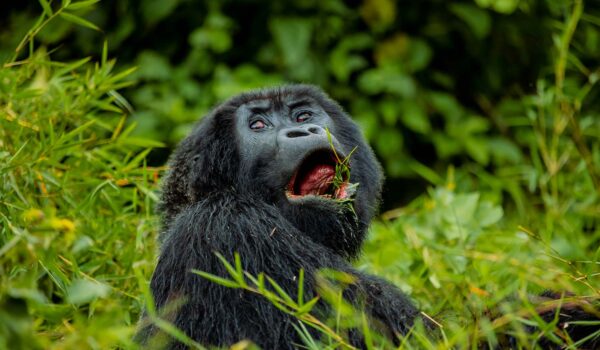Best Places to Visit in Rwanda
Volcanoes National Park, located in northwest Rwanda, protects the Virunga Mountains’ slopes, which are home to mountain gorillas and a variety of montane habitats such as evergreen and bamboo forests, wide grasslands, marshes, and heathlands. Volcanoes National Park is Rwanda’s sole gorilla trekking destination and a refuge for African mountain gorillas. It is one of Africa’s greatest sites to witness these amazing apes in their natural habitat.
Volcanoes National Park was established in 1925, making it one of Africa’s oldest national parks. Volcanoes National Park is 160km²/62 mi² and borders Uganda’s Mgahinga Gorilla National Park and the Democratic Republic of the Congo’s Virunga National Park. Volcanoes National Park is home to five of the eight volcanoes, including the tallest, Mt Karisimbi (4507 m / 14790 feet). Rwanda has no active volcanoes, although the Democratic Republic of the Congo has. Volcanoes National Park features a diverse topography, ranging from tropical and bamboo forests to afro-alpine shrublands, as well as meadows, marshes, and thickets that spread between volcanoes.
Volcanoes is home to a large population of endangered mountain gorillas. Dian Fossey, a primatologist, researched gorillas here, and her work brought their predicament to worldwide notice, sparing them from extinction. Individual gorillas numbered just 254 in 1981, when the population was at its lowest point in the Virunga’s. Today, there are more over 1,000 gorillas in the three parks, making this one of Africa’s most successful conservation efforts. Rwanda gorilla trekking takes tourists to one of 12 habituated gorilla tribes in Volcanoes National Park, providing an unmatched once-in-a-lifetime experience. Visitors to Volcanoes National Park may also climb to the now-defunct Karisoke Research Centre, where Fossey and Digit died.
Aside from its famed gorilla inhabitants, Volcanoes National Park is home to endangered golden monkeys, secretive forest elephants, African buffaloes, spotted hyenas, gigantic forest hogs, bush pigs, black-fronted duiker, and bushbuck. Bird lovers will be rewarded with 178 documented bird species, including 17 endemics such as the Ruwenzori turaco, batis, and apalis, as well as the Dusky crimson wing.
Other sights to consider in your Volcanoes National Park tour are the Buhanga Eco-Park, a holy woodland steeped in Rwanda’s intriguing cultural traditions and mythology, and the Musanze Caves, which were created 62 million years ago during the last known volcanic eruption.
Rwanda Best Wild life Safari Destination
Akagera National Park
Akagera National Park, in eastern Rwanda, has a diversified ecology of savannah, marshes, and woods. Unlike the beautiful mountain parks, Akagera provides the typical African safari experience, with opportunities to see the Big Five – lions, leopards, elephants, buffalos, and rhinos. The park’s multiple lakes attract hippos, crocodiles, and a variety of bird species, making it a biodiversity hotspot.
A guided game drive in Akagera provides the opportunity to watch animals in a landscape evocative of the African plains, with vast open areas and golden grasses stretching into the distance. The park has seen a resurgence in recent years, owing to conservation measures that have effectively recovered its animal populations. Akagera’s distinctive environment, mixed with the excitement of seeing enormous beasts, make it a must-see for anybody looking for the ultimate safari experience in Rwanda.
Nyungwe forest National Park
Nyungwe Forest National Park, situated in southeastern Rwanda, provides an unforgettable rainforest experience. This ancient forest is one of Africa’s oldest and best-preserved rainforests, known for its biodiversity. The park is home to more than 300 bird species, various animal species, and, most notably, a significant population of chimps and other primates such as colobus monkeys. Chimpanzee trekking is one of the park’s key attractions, enabling visitors to witness these clever animals in their natural environment.
Nyungwe also has the Canopy Walkway, a suspension bridge that offers visitors an exciting experience to walk above the treetops, providing a unique viewpoint on the forest and panoramic views of the surrounding area. Hiking routes weave across the park, displaying waterfalls, orchids, and lush jungle vegetation. Nyungwe Forest is ideal for nature enthusiasts and those looking for a tranquil vacation in one of Africa’s greenest sanctuaries.
Kigali city
Kigali, Rwanda’s capital and biggest city, is both a gateway to the country and a thriving metropolitan center. Kigali is one of Africa’s safest and cleanest cities, with a unique blend of technology and heritage. The Kigali Genocide Memorial is a must-see landmark that provides a moving look at Rwanda’s sad history and the resilience of its people. The monument is a poignant homage to the lives lost during the 1994 genocide, giving visitors with historical background as well as insight into Rwanda’s path to peace and reconciliation.
Kigali is also a vibrant cultural hotspot. The Inema Arts Centre exhibits modern Rwandan art, providing insight into the country’s inventiveness and tenacity. Furthermore, the city’s colorful marketplaces, like as Kimironko Market, welcome tourists to discover local crafts, fresh vegetables, and Rwandan cuisine. Kigali’s cafés, restaurants, and nightlife reflect a developing cosmopolitan attitude, making it a wonderful spot to unwind and discover Rwanda’s contemporary side.
Lake Kivu
Lake Kivu, situated on Rwanda’s western border with the Democratic Republic of the Congo, is one of Africa’s most stunning freshwater lakes. Lake Kivu, surrounded by beautiful hills, provides a tranquil setting for both rest and adventure. The lake’s beautiful waters are great for swimming, canoeing, and boating. Visitors may visit the picturesque lakeside villages of Gisenyi, Kibuye, and Cyangugu, each with its own perspective of the lake and surrounding mountains.
Lake Kivu’s islands, such as Napoleon Island and Amahoro Island, are also popular tourist destinations, providing birding possibilities and private picnic areas. Hotels and chalets line the lake’s shoreline, making it an ideal place to rest after a wildlife adventure. The communities around Lake Kivu offer a laid-back environment, allowing tourists to experience Rwandan friendliness, sample local cuisine, and admire the lake’s tranquil beauty.
The King’s Palace Museum and Ethnographic Museum
Visit the King’s Palace Museum in Nyanza and the Ethnographic Museum in Huye to have a better grasp of Rwandan history and culture. The King’s Palace Museum is a rebuilt traditional royal palace that provides information on pre-colonial Rwandan royalty and the lifestyles of the country’s past rulers. Visitors may learn about ancient ceremonies, royal insignia, and the holy cows known as Inyambo, who are famed for their magnificent long horns.
The Ethnographic Museum in Huye offers a more comprehensive picture of Rwandan culture, including displays on archaeology, ethnology, and Rwandan art. It is one of the top museums in East Africa, featuring exhibits depicting Rwanda’s social structure, beliefs, and traditional life. Visiting these museums provides insight into Rwanda’s rich legacy and the pride that its people have in their history and culture.

